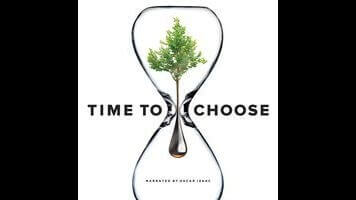Time To Choose is the rare hopeful environmentalist documentary

Anyone who spends enough time watching activist, agitprop “issue documentaries” should be familiar with that “Welp!” feeling. After spending an hour or so hearing about how corporations have stacked the deck against the working class, and how we’re running out of potable water, and how everything from obesity to oil spills to debt to antibiotic-resistant superbugs will inevitably kill us all, the best viewers can do is throw their hands in the air, say “Welp!,” and then go out and spend money they don’t have to get dangerously hammered and gorge on poisonous junk food—because there’s apparently no reason to try to fix anything.
Charles Ferguson’s documentaries don’t incline toward despair. In his No End In Sight (about the logistical fiasco of the Iraq War) and his Oscar-winning Inside Job (detailing exactly what led to the financial crisis of 2008), Ferguson tells stories from our shared recent history with not only a definite political slant but also an evenhandedness that expresses an uncommon faith in human agency. His films suggest that catastrophes aren’t unstoppable but are the result of bad choices made by people who should know better—and who could thus avoid making those mistakes again. That sense of backhanded optimism sets Ferguson’s Time To Choose apart from the countless other documentaries about climate change. It isn’t a brilliant piece of filmmaking or even a revelatory work of journalism. But Time To Choose may provoke actual action, if only because it doesn’t conclude that we’re doomed.
Ferguson takes a broad environmentalist view with Time To Choose, traveling around the world to look at some of the biggest contributing factors to climate change: overreliance on fossil fuels, excessive meat consumption, car-centric urban planning. Every time he lays out the scope and potential global impact of the problem, he visits a community that’s been putting alternatives into action. Time To Choose documents the proliferation of solar panels in impoverished African villages that have never had any kind of electricity before. And it tours European and South American cities that have reimagined how bicycles and buses can facilitate mass transit without inconveniencing commuters.
As often happens with movies that confront our potential environmental apocalypse, Time To Choose focuses a lot on China—as both a cautionary tale and an early indicator of the real progress in the pushback against climate change. Ferguson’s interview subjects ding China for its large-scale exploitation of natural and human resources and for building massive urban complexes that demand long drives in automobiles, isolating people from each other. But the film also notes that the country’s monumental manufacturing sector and minimal red tape have allowed for a quick transition to solar and wind—which its industries demand because they’re cheaper, not out of any altruistic impulse. That’s ultimately what Time To Choose is arguing: We may survive thanks to the same greedy self-interest that got us into trouble in the first place.
Stylewise, there’s nothing all that special about this movie. It’s handsomely shot, with lovely images of solar and wind farms that frame the new technology in the same way that Netflix’s food-porn series Chef’s Table ogles dinner. Ferguson also has the smooth voice of Oscar Isaac to put the audience at ease. But Time To Choose is doggedly conventional, mixing facts and figures with expert testimony and you-are-there footage, with little attempt to shake up the formula. It even ends with a URL, which has become the universal symbol for a documentary that could just as easily be a pamphlet.
Still, Ferguson’s overall measured tone—never hectoring, never smug, always informed—is enough to distinguish Time To Choose. Calmly, the filmmaker makes the case that the course we’ve been on is unsustainable, while observing that cutting-edge businesses are actually inclined to make positive change, provided that entrenched climate-destroying industries don’t keep using their government connections to block them. Rather than shrugging with disgust, Ferguson points to the better world that nearly everybody wants and that already exists in some places. Then he simply asks that we vote for it.